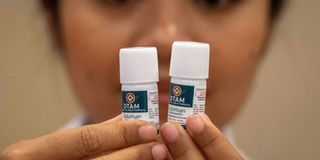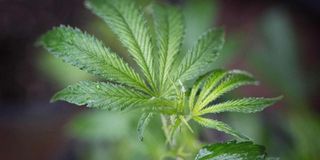
A packet of Hempworx.
| Kanyiri Wahito | Nation Media GroupNews
Premium
Wonder drug or overhyped ‘marijuana cousin’? Where to get CBD in Nairobi
By now you must have heard of CBD, the ‘wonder’ drug that some manufacturers claim is capable of treating a wide range of diseases, including cancer, heart disease and Aids.
CBD is short for cannabidiol, which is derived from the hemp plant, a cousin of the marijuana plant.
Unlike pot, which contains THC (Tetrahydrocannabinol), the chemical compound that makes you high, CBD has no such effect.
In the US, where it is all the rage, this extract is being infused in just about everything; from coffee, burgers, water, chocolate, breakfast cereal, even popcorn. Various celebrities have praised its benefits, including reality star Kim Kardashian, who says it helps her sleep — she even held a CBD-themed baby shower that featured a CBD-infused chocolate fountain, lotions and oils, and during which the invitees were educated on its benefits.

A nurse looks at vials with cannabidiol (CBD) oil during the opening of a cannabis (marijuana) clinic in Bangkok, Thailand on January 6, 2020.
Crackdown
In December last year, the Federal Trade Commission, whose mandate is to protect America’s consumers from deceptive and unfair business practices, initiated a crackdown on “deceptively marketed CBD products” such as oils, balms, coffee and even sweets containing the extract, accusing the sellers of making unsubstantiated claims that their products could treat serious diseases such as cancer, diabetes,heart disease, hypertension and Alzheimer’s disease.
The FTC has gone on to take action against six sellers of these CBD-containing products, pointing out that the claims are scientifically unsupported.
Well, CBD is being widely sold in the country, with advertisement on social media platforms such as Instagram and Facebook driving sales in a market that is already willing.
Many of the products claim to “help” with the treatment of cancer, kidney disease, heart disease, HIV, acne, depression, stroke and even nausea.
Online shops
There are quite a number of shops selling CBD oil, with the majority doing their business strictly online, where you have to trust that you will get what you actually pay for.
A short search on the internet leads us to one of the sellers. We call the number given on the site and a woman answers. It is 10am on a Thursday. We explain that we want a product that will cure persistent joint pain. She quickly tells us that she has just the product for us. There are only two sizes left, the 500ml package that costs Sh12,000 and the 750ml, which will cost us Sh15,500. The smallest size, the 250ml bottle, which goes for Sh4,500, has reportedly sold out.
We settle for the 500ml bottle and ask where she is located so that we can pick up our package.
She informs us that her business is strictly online, that if we give her our location, she will have it delivered to us. But we have to pay in advance via M-Pesa.

A marijuana plant in a greenhouse in Mendocino County, California. The CBD industry is projected to hit USD16 billion in the United States by 2025.
No receipts
We inform her that we will require a receipt as proof of payment, just in case we are not satisfied with the product, to which she responds that due to the delicate nature of the business, she does not issue receipts.
“I am not going to give you a receipt for the purchase because of the legal issues that surround the sale of the product in the country,” says the woman, who, in the course of our conversation, tells us that her supplier is based in Athi River, Machakos County.
“How do I trust that I am actually going to get the product after paying, given that I am dealing with someone I have never met?” we insist.
“Where did you get my number?” she retorts with an edge of impatience. “I have dealt with many people and have never conned anyone, please pay if you want us to deliver the oil.”
We make the payment, and within 40 minutes, the oil is delivered to the location agreed upon — in Eastlands. She charges a Sh600 delivery fee, but after some haggling, she agrees to meet half the cost.
‘Dietary supplement’
The oil is called HempWorx, and is described as “full spectrum CBD oil” and labelled “dietary supplement”. The manufacturing company is based in Las Vegas, in the US.
The packaging reads, “Our oil is carbon dioxide extracted resulting in a solvent free and pure extract. A more centred you is just a few drops away. Experience the benefits of full spectrum CBD in its true form.”
It goes on to warn that the product has not been evaluated by the Food and Drug Administration and that it is not intended to diagnose, treat, cure or prevent any disease. Yet the woman had assured us on the phone that it was only a matter of time and the “joint pain” would go away for good.
The instructions say one should apply a few drops of the oil under the tongue twice a day, holding for 60 seconds before swallowing.
The sales woman informs us that the bottle has over 1,000 drops and recommends administering five drops in the morning and five drops in the evening. If the pain will not have gone away with the first bottle, she advises, the second will surely do the trick, she assures us.
“CBD is being used all over the world and is helping many people. The government should just make it legal to sell it here because it will benefit many Kenyans,” she comments.
‘Testimonials’
Once we make the payment, she sends us several “testimonials” of people she says were cured of various ailments such as arthritis, diabetes and vertigo after using CBD.
We also come across a Kenyan website marketing the chemical compound, which summarises its benefits as helping with severe migraines, inflammation and arthritic pain, relieving anxiety and “anti-seizure treatment for epilepsy”.
‘Endorsed’ by celebrities
It also lists the extract as a cure for insomnia, acne, cancer and period pain. It then goes on to issue a list of celebrities who have “endorsed” CBD, including reality star Kim Kardashian, actress Jennifer Aniston and Gwyneth Paltrow.
But the oil is not only being sold online. You are also likely to find it on the shelves of outlets that sell supplements.
At one such outlet, a 500ml bottle of CBD is selling at Sh15,000, while the 750ml one is going for Sh17,000.
“Do you have CBD oil?” we ask the attendant at the counter of the store along Mama Ngina Street in Nairobi’s CBD.
“Yes, but only the bigger sizes are left, the smaller ones are out of stock. What do you want it for?” he asks.
He informs us that the brand he has will not only get rid of the pain, it is also a cure for fatigue and is fantastic if you want to relax.
“Just put three drops under your tongue and you will relax,” he says.
In 2018, the United States’ Food and Drug Administration approved Epidiolex, a purified CBD extract, to treat two rare and severe types of childhood epilepsy, but it remains the only CBD-derived drug approved by the agency.
In November 2020, however, the European Union’s court of justice ruled that CBD is not a narcotic drug because it did not appear to affect one’s mental health or have any harmful effect on one’s health. This was in relation to the prosecution of KanaVape, a company that deals in CBD oil made from whole hemp plants.
A study published online in 2011 by the journal Neuropsychopharmacology found that CBD reduced anxiety induced by simulated public speaking for those that suffered from social anxiety.
Double-blind study
However, a double-blind study, where neither participants nor experimenters know who is receiving a particular treatment, found that healthy volunteers that were administered CBD showed little to no emotional change when shown unpleasant images or words, compared to the group that was administered a placebo.
No studies have been done to show its effects on diseases such as cancer, diabetes and heart disease.
In Africa, it is only countries such as South Africa which allow, to some extent, sale of CBD.
In Kenya, even though the law does not make any mention of CBD, the sale of cannabis in any form is prohibited.
****
Facts about CBD
*There are three main types of CBD: CBD isolate is the pure form of CBD, it contains no other cannabis plant compounds and usually comes from hemp plants, which typically contain very low amounts of THC, the chemical compound in marijuana that makes the user “high”.
*The second type is the full-spectrum CBD, an extract containing other compounds of the cannabis plant, such as terpenes and may also contain up to 0.3 per cent of THC
*The third type is broad-spectrum CBD, which contains a range of naturally occurring compounds from the cannabis plant, but in most cases does not contain THC.
*Most of the research on cannabidiol has been in animals.
*According to the New York Times, The CBD industry is projected to hit USD16 billion in the United States by 2025.
*More than 60 per cent of CBD users have taken it to manage anxiety, according to a survey of 5,000 people by the Brightfield Group, a cannabis market research firm.
More than 60 per cent of CBD users have taken it for anxiety, according to a survey of 5,000 people, conducted by the Brightfield Group, a cannabis market research firm.
Although the 2018 Farm Bill legalised hemp under federal law, it also preserved the Food and Drug Administration’s oversight of products derived from cannabis.
A study in the European Journal of Pain suggests that skin-applied CBD can help lower arthritic pain, but there is a lack of clinical evidence for its overall efficacy, and concern over the unregulated nature of the CBD market.






